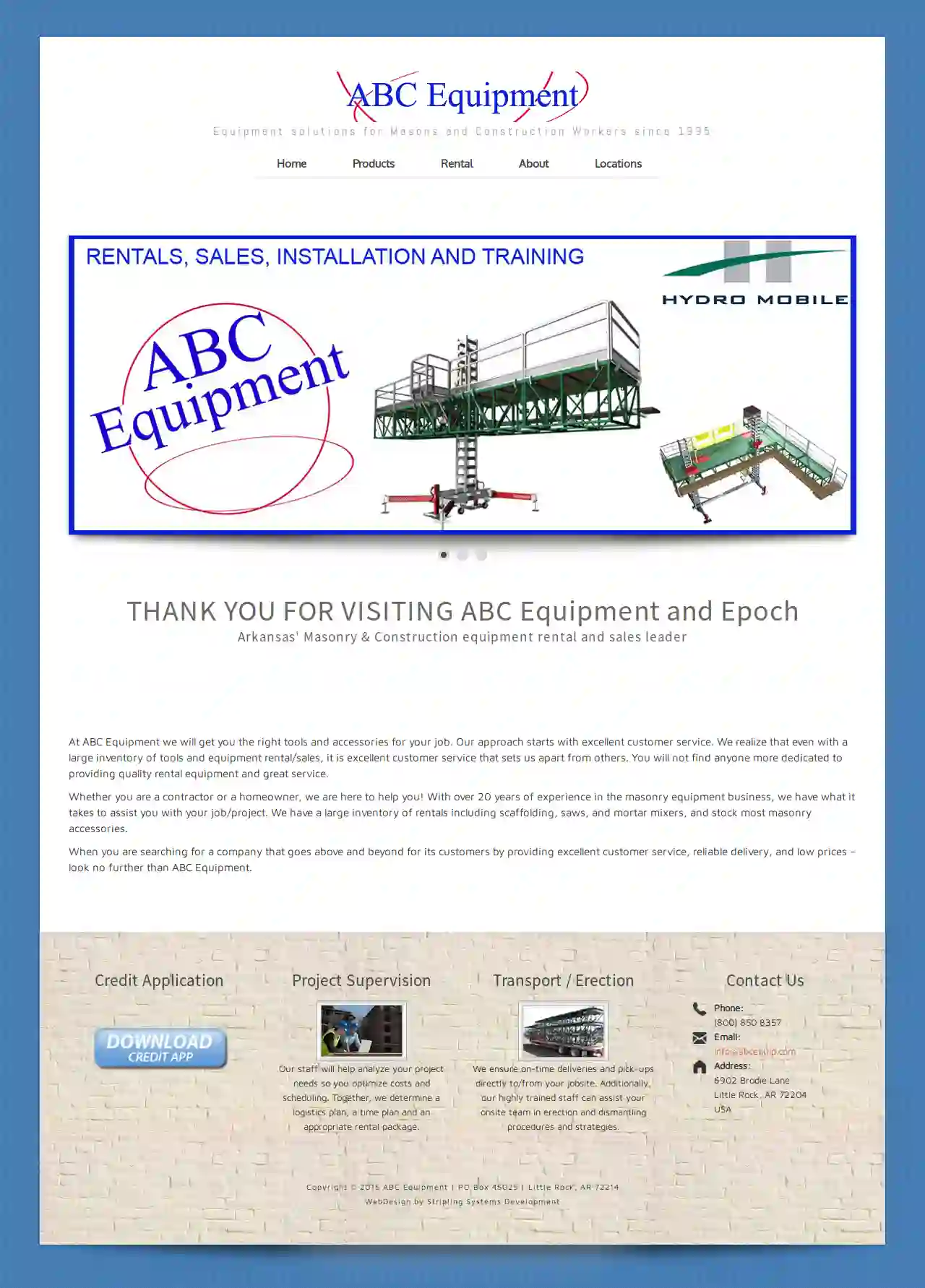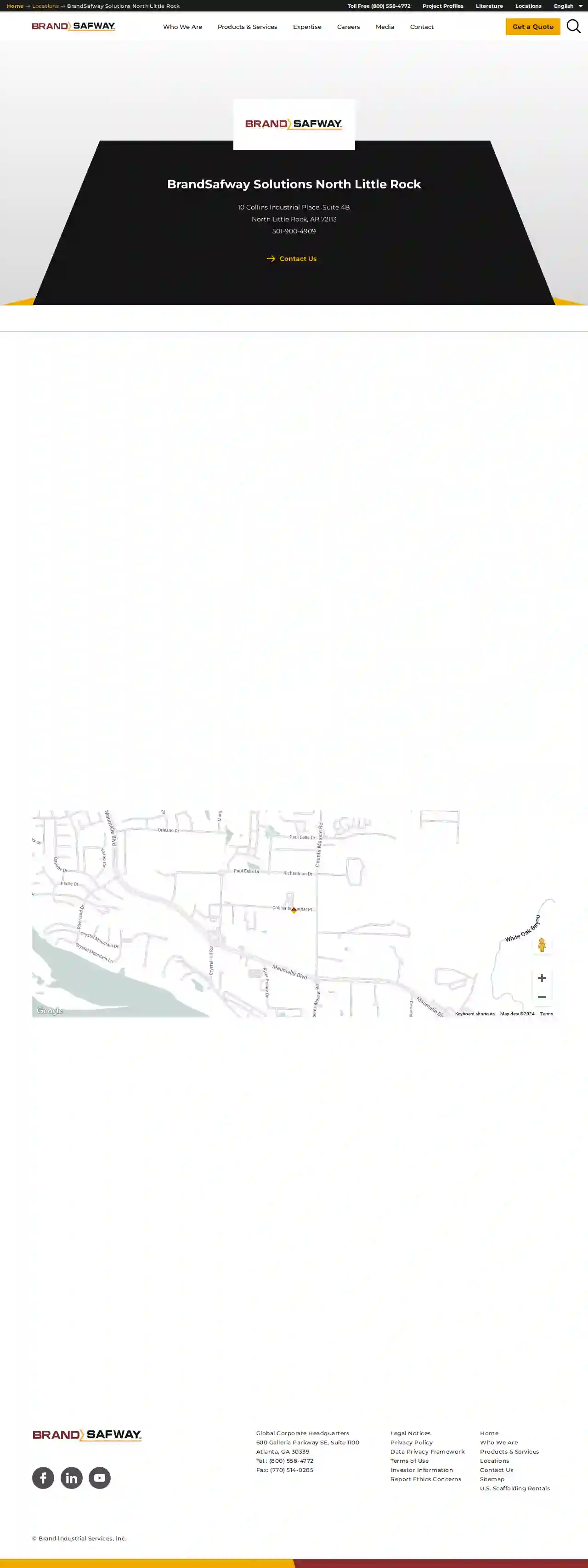Scaffolding Companies Forrest City
Find the best Construction Scaffolding in Forrest City
Get up to 3 Scaffolding Experts quotes for your project today! Compare profiles, reviews, accreditations, portfolio, etc... and choose the best deal.

ABC Equipment
4.19 reviews6902 Brodie Lane, Little Rock, 72204, USABC Equipment: Your Partner in Masonry & Construction Since 1995, ABC Equipment has been a trusted provider of equipment solutions for Masons and Construction Workers in Arkansas. We understand the importance of having the right tools for the job, and we're committed to providing our customers with the highest quality equipment and exceptional customer service. Our team is dedicated to helping you succeed. We offer a wide range of rental equipment, including scaffolding, saws, mortar mixers, and a variety of masonry accessories. We also provide project supervision, transportation, and erection services to ensure your project runs smoothly. Whether you're a seasoned contractor or a homeowner tackling a DIY project, ABC Equipment is here to support you. We're proud to offer competitive prices, reliable delivery, and a commitment to exceeding your expectations. We're more than just an equipment rental company; we're your partners in success. Contact us today to learn more about how we can help you achieve your project goals.
- Services
- Why Us?
- Gallery
Get Quote
BrandSafway Solutions North Little Rock
North Little Rock, AR, 1234 Industrial Blvd, 72118, USBrandSafway is a leading provider of access solutions, including scaffolding, aerial work platforms, and forming and shoring. With a strong commitment to safety, quality, and customer satisfaction, BrandSafway offers a wide range of services tailored to meet the unique needs of clients across various industries. Their team of experienced professionals is dedicated to delivering innovative solutions that enhance efficiency and productivity, ensuring successful project outcomes.
- Services
- Why Us?
- Accreditations
- Our Team
- Testimonials
Get Quote- Un
Universal Scaffolding & Equipment
4.33 reviewsLittle Rock, US- Services
- Why Us?
Get Quote - Un
Universal Dock & Door
Little Rock, US- Services
- Why Us?
Get Quote
Over 2,353+ Scaffolding Businesses onboarded
Our scaffolding contractors operate in Forrest City and surroundings!
ScaffoldingHQ has curated and vetted the Best Scaffolding Companies in and around Forrest City. Find the most trustworthy contractor today.
Frequently Asked Questions About Scaffolding Companies
- Project Size and Complexity: The height, configuration, and accessibility of the scaffolding will influence the amount of materials and labor required.
- Scaffolding Type: Different scaffolding systems (tube and clamp, system scaffolding, suspended scaffolding) have varying costs.
- Duration of Rental: The length of time you need the scaffolding will affect the overall rental price.
- Location: Labor costs and material availability can differ based on your location.
- Additional Services: Some companies may offer additional services like erection, dismantling, or transportation, which can add to the cost.
- Stability and Level: The scaffolding is level and firmly supported by a solid foundation.
- Secure Connections: All components (tubes, clamps, fittings) are properly connected and tightened.
- Guardrails and Toeboards: Adequate guardrails and toeboards are in place to prevent falls.
- Platforms and Decking: Platforms are secure, free from damage, and provide adequate working space.
- Access and Egress: Safe access and exit points are available (ladders, stairs).
- Weather Protection: Appropriate measures are in place to protect workers from adverse weather conditions (e.g., wind screens, covers).
- Clearance from Hazards: The scaffolding is a safe distance from power lines, trees, or other potential hazards.
- Scaffolding Tag: The scaffolding tag is up-to-date and displays the last inspection date, maximum load capacity, and any restrictions.
- Experience: 'How long have you been in business, and what experience do you have with projects like mine?'
- Licensing and Insurance: 'Are you fully licensed and insured, and can I see proof of coverage?'
- Safety Record: 'What are your safety procedures, and how do you ensure worker safety on the job site?'
- References: 'Can you provide references from previous clients?'
- Quotes and Costs: 'Can you provide a detailed quote that outlines all costs, including materials, labor, and any additional services?'
- Project Timeline: 'What is the estimated timeframe for scaffolding erection and dismantling?'
- Communication: 'How will you communicate with me throughout the project?'
- Encroaches onto public property (sidewalks, roads): Permits are usually needed from the local council or highway authority.
- Exceeds a certain height: Scaffolding above a specified height often requires a permit.
- Is erected in a conservation area or near a listed building: Special considerations and permits may apply.
How much does scaffolding cost to hire in the USA?
What should I look for during a scaffolding inspection?
What questions should I ask a scaffolding company before hiring them?
Do I need a permit for scaffolding in the USA?
How much does scaffolding cost to rent in the USA?
- Project Size and Complexity: The height, configuration, and accessibility of the scaffolding will influence the amount of materials and labor required.
- Scaffolding Type: Different scaffolding systems (tube and clamp, system scaffolding, suspended scaffolding) have varying costs.
- Duration of Rental: The length of time you need the scaffolding will affect the overall rental price.
- Location: Labor costs and material availability can differ based on your location.
- Additional Services: Some companies may offer additional services like erection, dismantling, or transportation, which can add to the cost.
What should I look for during a scaffolding inspection?
- Stability and Level: The scaffolding is level and firmly supported by a solid foundation.
- Secure Connections: All components (tubes, clamps, fittings) are properly connected and tightened.
- Guardrails and Toeboards: Adequate guardrails and toeboards are in place to prevent falls.
- Platforms and Decking: Platforms are secure, free from damage, and provide adequate working space.
- Access and Egress: Safe access and exit points are available (ladders, stairs).
- Weather Protection: Appropriate measures are in place to protect workers from adverse weather conditions (e.g., wind screens, covers).
- Clearance from Hazards: The scaffolding is a safe distance from power lines, trees, or other potential hazards.
- Scaffolding Tag: The scaffolding tag is up-to-date and displays the last inspection date, maximum load capacity, and any restrictions.
What questions should I ask a scaffolding company before hiring them?
- Experience: 'How long have you been in business, and what experience do you have with projects like mine?'
- Licensing and Insurance: 'Are you fully licensed and insured, and can I see proof of coverage?'
- Safety Record: 'What are your safety procedures, and how do you ensure worker safety on the job site?'
- References: 'Can you provide references from previous clients?'
- Quotes and Costs: 'Can you provide a detailed quote that outlines all costs, including materials, labor, and any additional services?'
- Project Timeline: 'What is the estimated timeframe for scaffolding erection and dismantling?'
- Communication: 'How will you communicate with me throughout the project?'
Do I need a permit for scaffolding in the USA?
- Encroaches onto public property (sidewalks, roads): Permits are usually needed from the local council or highway authority.
- Exceeds a certain height: Scaffolding above a specified height often requires a permit.
- Is erected in a conservation area or near a listed building: Special considerations and permits may apply.